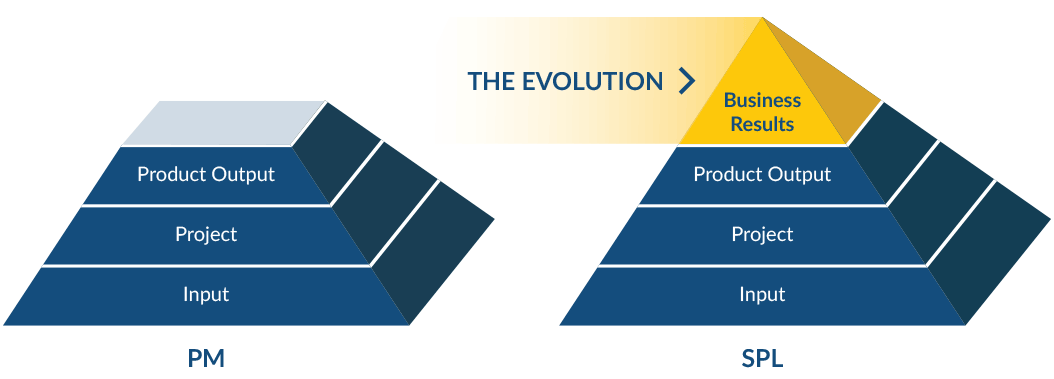If it’s a job, what do you have to do? If it’s a profession, what do you have to know, and what skills do you need? Typically, most project managers get the job first; then they try to figure out what they have to know and do. Ironically, in almost all professions like law or medicine, you will get a job only after you’ve demonstrated the knowledge, or have been certified. In project management, however, it’s in reverse. What’s even worse, in many cases your new job wasn’t even well-defined for you, and your career path from there on, is not so clear. Yet, this transition, for most people represents a significant change and a beginning of a life-long learning process.
The common belief that I intend to dispute, is, that project managers are supposed to deliver the project’s product (the output) on time, budget, and scope – what is commonly known as the “triple constraint.” And they must learn a collection of skills such as scope management, risk management, time management, etc., as well as planning, executing, monitoring, controlling, etc.

I contend that this view will soon become a myth, and is just part of the picture. In today’s challenging project environments, effective project managers are often required to do a lot more. Furthermore, in spite of the well-known and established tools, most projects aren’t even meeting their time and budget goals, while in fact, there is something more important than meeting delivery goals. We should realize that the major goal of any project is to create real value and if relevant, achieve business results. Therefore, based on our research, I suggest that any project team should be concerned with the outcome, not just the output. I believe that we are standing at the gate of a new era in the profession, which would demand aligning project execution with business, and turning managers into business leaders. This era will transform the profession in the next few years. We call this evolution Strategic Project Leadership® (SPL).
To put things in perspective, even when projects meet their time and budget goals, it does not always guarantee successful businesses. In contrast, there are projects that did not meet their planned schedules, but turned out to be huge commercial successes. Simply said, almost all projects are initiated either to make money, save money, or create new value. Collectively, we could define each one of these goals as the “business objective” of the project. If this is the case, it means that just meeting the triple constraint is insufficient.
At this time, however, many project teams are still not really concerned about meeting business objectives during the execution period. At best, they receive a business case, or more typically, just a list of requirements as determined prior to the project. From there on, they often keep focusing on the traditional (and no doubt, important) elements of planning, executing, monitoring and delivering.
But this is about to change. While initial business objectives will still be determined prior to the project, today’s fast pace of change in technology, competition, and markets, suggest that unless project teams look and understand the project’s business objectives, and work to improve the value imbedded in the final product, many projects may end up irrelevant when they reach the market. In the SPL world, we call it “strategic execution,” and it is becoming a more and more important part in any project manager’s job.
So let me go back to the initial question - defining the project manager’s job and responsibility: Project managers should be made responsible for achieving the project’s business objectives, in addition to timely delivery. Project managers should start running their projects with a business-focused mindset, and adopt the tools to do that (more on tools in future assays). Furthermore, based on this perspective, I suggest to redefine a project as follows: “A project is a temporary organization and leadership process, set up to achieve business results and maximize outcome value.” By adopting this view, project managers will not only be more attuned to the outcome, but their teams will also be more engaged while contributing to the creation of final value.
Some who read this idea may question its validity: Since when do we ask a project manager to be responsible for the business results, and if we do, what is the role left for a sponsor, an owner, or an executive? Isn’t it contrasting the traditional hierarchy and separation of roles between sponsors, and project managers? Well, not really. The right way is to see the discipline is to still consider the sponsor accountable. If the project makes or loses money, the project manager does not enjoy the gains or suffer the losses. The company does. However, he/she is still responsible for the results, which can only be achieved during the execution period. An analogy may be a ship’s captain. A captain is always responsible for bringing the ship safely to its destination. But he does not own the ship. If the ship is late, he/she is not paying the company’s losses.
In the next Assay, we will expand this discussion and deal with the question of the new skills needed to address this evolution.











